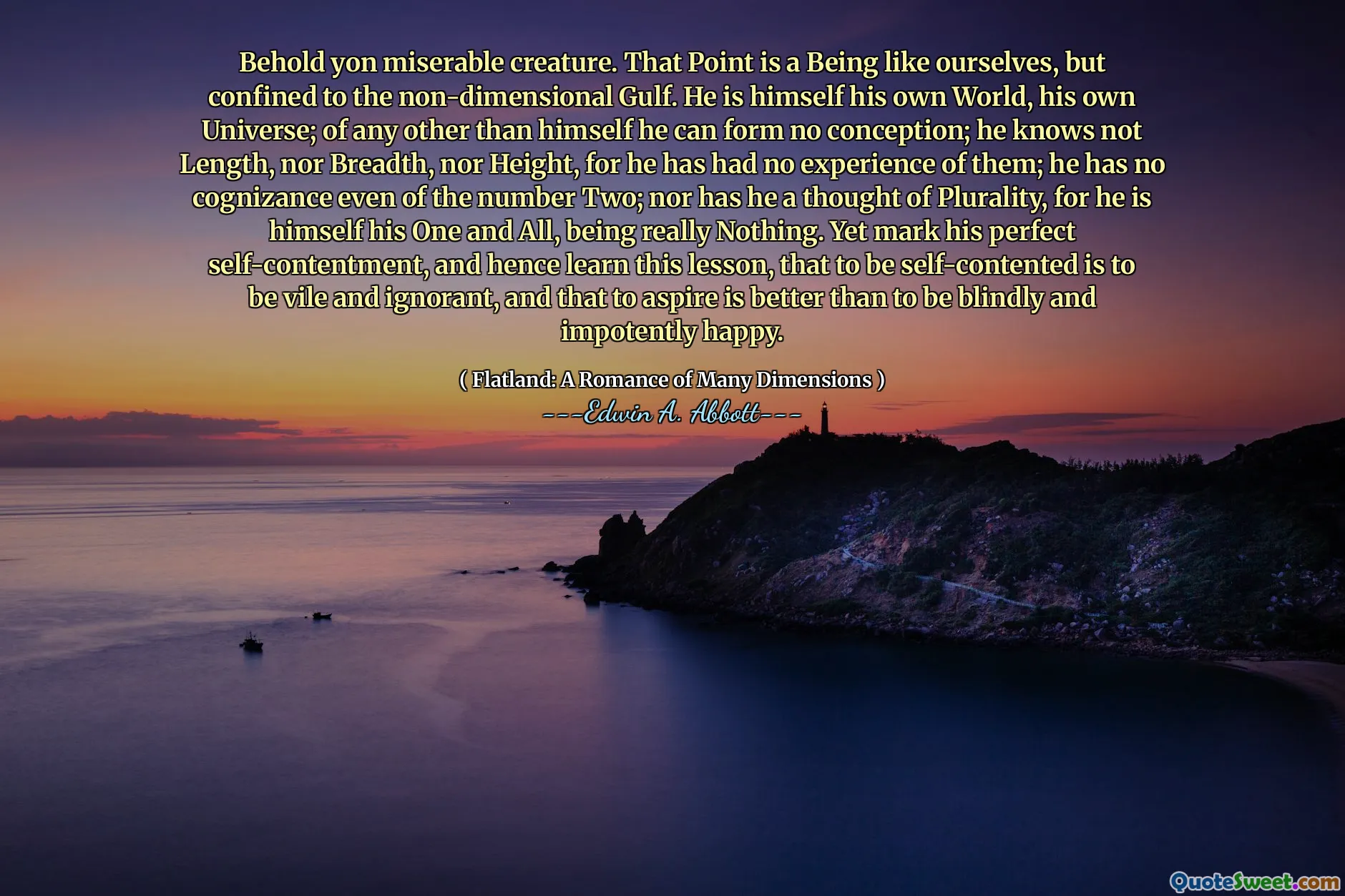
Behold yon miserable creature. That Point is a Being like ourselves, but confined to the non-dimensional Gulf. He is himself his own World, his own Universe; of any other than himself he can form no conception; he knows not Length, nor Breadth, nor Height, for he has had no experience of them; he has no cognizance even of the number Two; nor has he a thought of Plurality, for he is himself his One and All, being really Nothing. Yet mark his perfect self-contentment, and hence learn this lesson, that to be self-contented is to be vile and ignorant, and that to aspire is better than to be blindly and impotently happy.
This quote from Edwin A. Abbott's "Flatland: A Romance of Many Dimensions" presents a rich metaphorical exploration of consciousness, dimension, and the nature of contentment. The Point symbolizes a being limited to an utterly minimal and non-dimensional existence—so restricted that it lacks any understanding of spatial concepts or plurality. This characterization serves as a profound allegory on the human condition, particularly addressing the dangers of self-contentment in ignorance.
One striking aspect of this reflection is the intrinsic isolation of the Point. It inhabits a world entirely self-contained, with no means to perceive anything beyond itself, suggesting a profound limitation of perspective. This limitation can be seen as a critique of closed-mindedness or intellectual stagnation in real life. People who are comfortable within the narrow confines of their experience, without seeking greater knowledge or understanding, can be likened to this Point—self-contained, yet essentially 'nothing' in a larger, richer context.
The quote explicitly condemns this self-contentment as "vile and ignorant," which is a strong moral judgment. It implies that ignorance, when cloaked in satisfaction with oneself, is particularly problematic because it breeds complacency and prevents growth. There is an inherent value in aspiration—the desire to transcend current limitations—over the false security of blissful ignorance. This idea resonates deeply with philosophical themes about the pursuit of knowledge, self-improvement, and the tension between comfort and challenge in the human psyche.
Moreover, the Point lacking any concept even of multiplicity emphasizes the importance of awareness beyond selfish or self-centered viewpoints. It suggests that true understanding and growth stem from recognizing and relating to the 'other' or the external world, breaking free from solipsistic confines. This aligns well with the broader thematic structure of "Flatland," where dimensions beyond the immediate perception represent higher knowledge or enlightenment.
In practical terms, this quote encourages readers to question their assumptions and remain intellectually curious, recognizing the limitations of their own perspectives. The cautionary note against complacent happiness invites a reflection on what it means to live a fulfilling life—implying that a life oriented towards growth and aspiration, even with its inherent discomfort and challenges, holds greater value than one of passive acceptance.
It also subtly critiques utopian ideals based on simplistic contentment, warning that contentment alone is not synonymous with virtue or wisdom. True advancement—personal, philosophical, or social—requires aspiration and a willingness to embrace complexity beyond comfort zones.
Ultimately, this passage captures a universal theme: the necessity of transcending limited perspectives and embracing the discomfort that comes with seeking deeper understanding. It reminds us that ignorance disguised as happiness is a hollow and, indeed, 'vile' state, and that the pursuit of knowledge and aspiration is both noble and necessary for genuine fulfillment.






